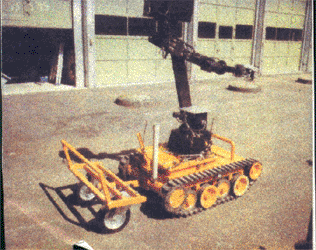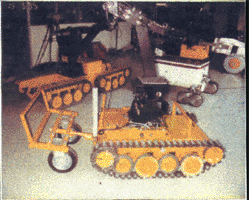The chair «robotic systems»prepares engineers on 2 specializations:
- Intellectual adaptive robotic systems
One of the main aspect of the robot, that makes the difference with any other machine, is that the robot should provide automatic work in the medium, that couldn't be defined on the stage of construction. That is why he has to obtain the information about the environment from the sensors - systems of artificial vision, force, moment and location sensors. He has to "form the picture" of the workspace, accumulate the knowledge, be able to make a decision, to plan his actions. These skills define the robot as an intellectual device, that is able to adapt to certain conditions.
For example, in the industrial companies the adaptive robots are applied on the assembly lines. The units of the machines are scattered around in the field of vision of robot. With such an approach there is no need in high-cost equipment for accurate positioning.
One of the most important field of application of the mobile robots are the tasks, that are related to emergency situations, liquidation of results of the accidents, rescue operations, demining and etc. Because these situations are completely unpredictable. Intellectual robots proceed on the surfaces of the other planets, in the deeps of the seas and oceans and under the ground.
Students of this specialization are ought to become the wide-range professionals, with the thorough knowledge of both the electronics, mechanics and the theory of automatic control and artificial intelligence. A lot of attention is payed to the questions of the sensor systems design, and to adaptation of robotic systems. Students obtain the experience in programming and in instruction of real robotic complexes. They learn problem-oriented languages of programming, get practice in analysis of real robotic complexes.
- Distributed intellectual robotic systems
Development of technical systems and raising the complexity of the tasks resulted in a new class of robotic systems - distributed robotic systems.
During the processing of the task, given to a robotic system, each subsystem should do some certain part of the work, cooperating with the others. Such a system is some kind of a team, with the members working together.
In the assembly line of an automobile production company there are several manipulators, operating simultaneously, each one doing his own part of the work, coordinating with each other. A space station automatic assembly line requires manipulators, systems of technical vision and other technological devices. Exploration of places, difficult or dangerous to access, can be done with the help of the mobile robot, equipped with various sensor systems. All these systems are related to parallel processing and cooperation of subsystems.
Introducing this class of the systems caused new scientific approaches, such as command theory and system simulation. One of them - is multi-agent systems has become wide-spread recently. It is used not only in technical systems, but in the latest innovations of computer science. Thus the term "agent" is widely used in web application programming.
Students of this specialization study modern aspects of discrete mathematics (abstract finite state automates, Petri networks), distributed artificial intelligence, new methods of discrete systems' command theory and simulation of the processes. All disciplines are accompanied with the extensive learning of Object Oriented Programming in multi-task real-time operating systems, as well as consideration of the details of programming for local networks.
Wide range of skills of graduate provides possibility to find application of his knowledge in various spheres of technology, related to computer sciences or command of complex system command.
|
|
|
|
|







